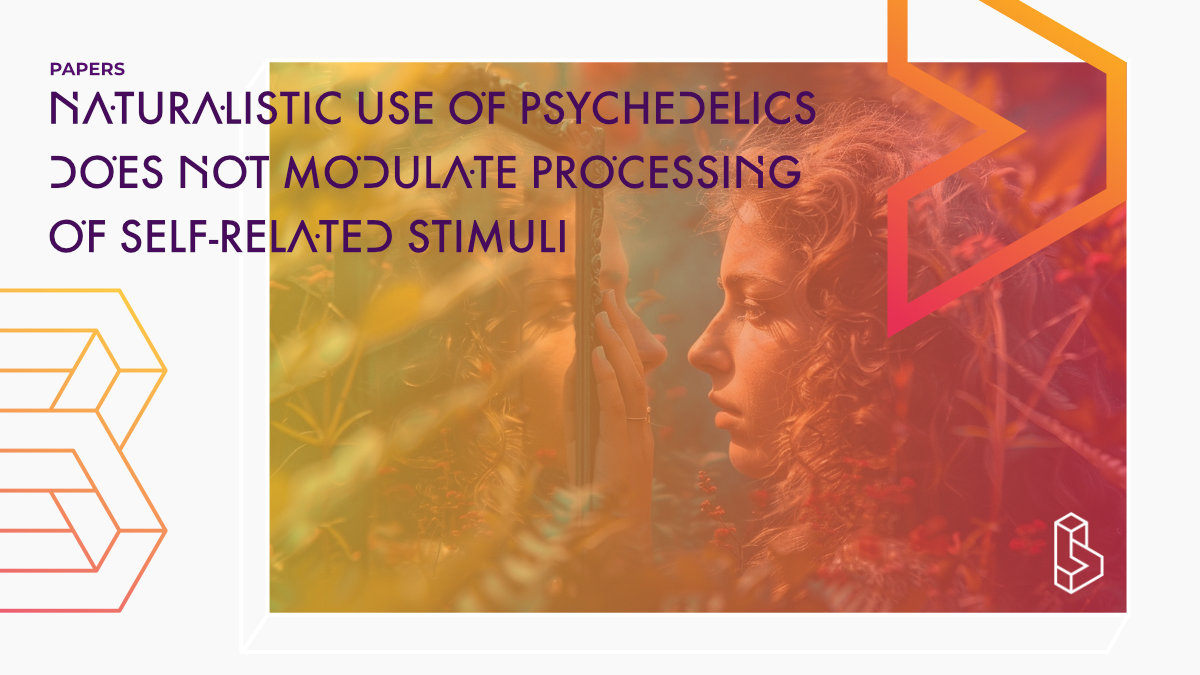This cross-sectional study (n=113) compared experienced psychedelic users (n=56) to nonusers (n=57) regarding neural responses to Self-name stimuli, known for activating self-representation. While no difference in P300 amplitude was found between users and nonusers for Self- or Target-names, users exhibited increased P300 amplitude for Other-names. Additionally, users showed a smaller increase in P300 amplitude for task-relevant stimuli compared to nonusers, suggesting potential alterations in attentional resource allocation rather than prolonged changes in self-representation due to psychedelic use.
Abstract of Naturalistic use of psychedelics does not modulate processing of self-related stimuli
“Classic psychedelics are able to profoundly alter the state of consciousness and lead to acute experiences of ego dissolution – the blurring of the distinction between representations of self and the external world. However, whether repeated use of psychedelics is associated with more prolonged and permanent modifications to the concept of self remains to be investigated. Therefore, we conducted a preregistered, cross-sectional study in which experienced psychedelics users (15 or more lifetime experiences with psychedelics; N = 56) were compared to nonusers (N = 57) in terms of neural reactivity to a Self-name (i.e., each participant’s own name) stimulus, which is known to robustly activate a representation of self. Two control stimuli were additionally used: an Other-name stimulus, as a passive control condition in which no reaction was required, and a Target-name stimulus, to which participants provided a manual response and which thus constituted an active control condition. Analysis of the amplitude of the P300 ERP component evoked by the Self- or Target-names revealed no difference between the psychedelics users and nonusers. However, psychedelic users exhibited increased P300 amplitude during perception of Other-names. In addition, in comparison to nonusers, psychedelics users exhibited a smaller increase in P300 amplitude when processing the task-relevant Target-names (in relation to both Self- and Other-names). Therefore, our data suggests that regular naturalistic use of psychedelics may not be related to long-term changes in the representation of self, but it might potentially affect the allocation of attentional resources to task-relevant stimuli.”
Authors: Paweł Orłowski, Justyna Hobot, Anastasia Ruban, Jan Szczypiński & Michał Bola
Summary of Naturalistic use of psychedelics does not modulate processing of self-related stimuli
Psychedelic substances, such as psilocybin, LSD, mescaline, and DMT, have the ability to profoundly alter perception and state of consciousness. However, naturalistic use of psychedelics is typically associated with repetitive intake of substances in unregulated contexts with only moderate control over the substance quality and dose. Psychedelic experiences are rich, diverse, and highly dependent on both the user’s mindset and the surrounding environment. One of these aspects is ego dissolution, which is related to the acutely reduced activation and weakening of functional connectivity between regions within the default mode network. Regarding long-term psychological and clinical effects, ego dissolution experiences may be linked with diminished end-of-life depression, reduced anxiety and increased creativity. However, ego dissolution experiences might also lead to challenging long-term effects. To gain deeper insights into the mechanisms and consequences of ego-dissolution, it is crucial to explore how psychedelics affect the concept of self. Self-related stimuli attract attention, evoke faster manual reactions, and cause greater brain activation, as assessed by both electroencephalography and functional magnetic resonance imaging. For the present study, we used behavioral and neural responses to self-related stimuli to predict traits such as self-esteem, narcissism, and cultural background. We found that experienced meditators had smaller differences between EEG amplitudes related to processing of self and other faces.
The only experimental study to date that has investigated whether psychedelics influence processing of self-related stimuli was conducted by Migielski and colleagues (2020). Psilocybin acutely reduced the participants’ ability to discriminate between their own and a stranger ‘s voice. Migielski and colleagues (2020) provided compelling evidence that psychedelics can induce an acute blurring of the distinction between self and other, manifesting both behaviorally and in brain activity. Therefore, the authors hypothesized that regular users of classic psychedelics would exhibit lower reactivity to self-related stimuli than non-users. They hypothesized that users would have a lower P300 amplitude in response to the Self-name than non-users, but found no significant between-group differences in the P300 amplitude evoked by other and target names.
Find this paper
https://doi.org/10.1111/psyp.14583
Paywall | Google Scholar | Backup | 🕊
Cite this paper (APA)
Orlowski, P., Hobot, J., Ruban, A., Szczypiński, J., & Bola, M. (2024). Naturalistic use of psychedelics does not modulate processing of self-related stimuli (but it might modulate attentional mechanisms): an event-related potentials study comparing non-users and experienced users of classic psychedelics.
Study details
Participants
113
Humans
Linked Research Papers
Notable research papers that build on or are influenced by this paper
Naturalistic use of psychedelics is related to emotional reactivity and self-consciousness: The mediating role of ego-dissolution and mystical experiencesThis survey (n=1,661) found that a higher number of lifetime uses of psychedelics predicted greater positive and lower negative emotional reactivity while measures of self-consciousness predicted greater reflection and internal state awareness, reduced rumination tendency and public self-consciousness. The intensity of past mystical and ego-dissolution experiences mediated almost all the observed relationships between the lifetime number of psychedelic uses and psychological variables.
The relation between naturalistic use of psychedelics and perception of emotional stimuli: An event-related potential study comparing non-users and experienced users of classic psychedelics
This cross-sectional study (n=111) investigated neural markers associated with emotional reactivity in individuals with extensive naturalistic psychedelic use (15 or more lifetime experiences) compared to non-users. Experienced psychedelic users (n=56) exhibited significantly lower N200 amplitudes in response to fearful faces, suggesting reduced reactivity to emotionally negative stimuli at early processing stages.

